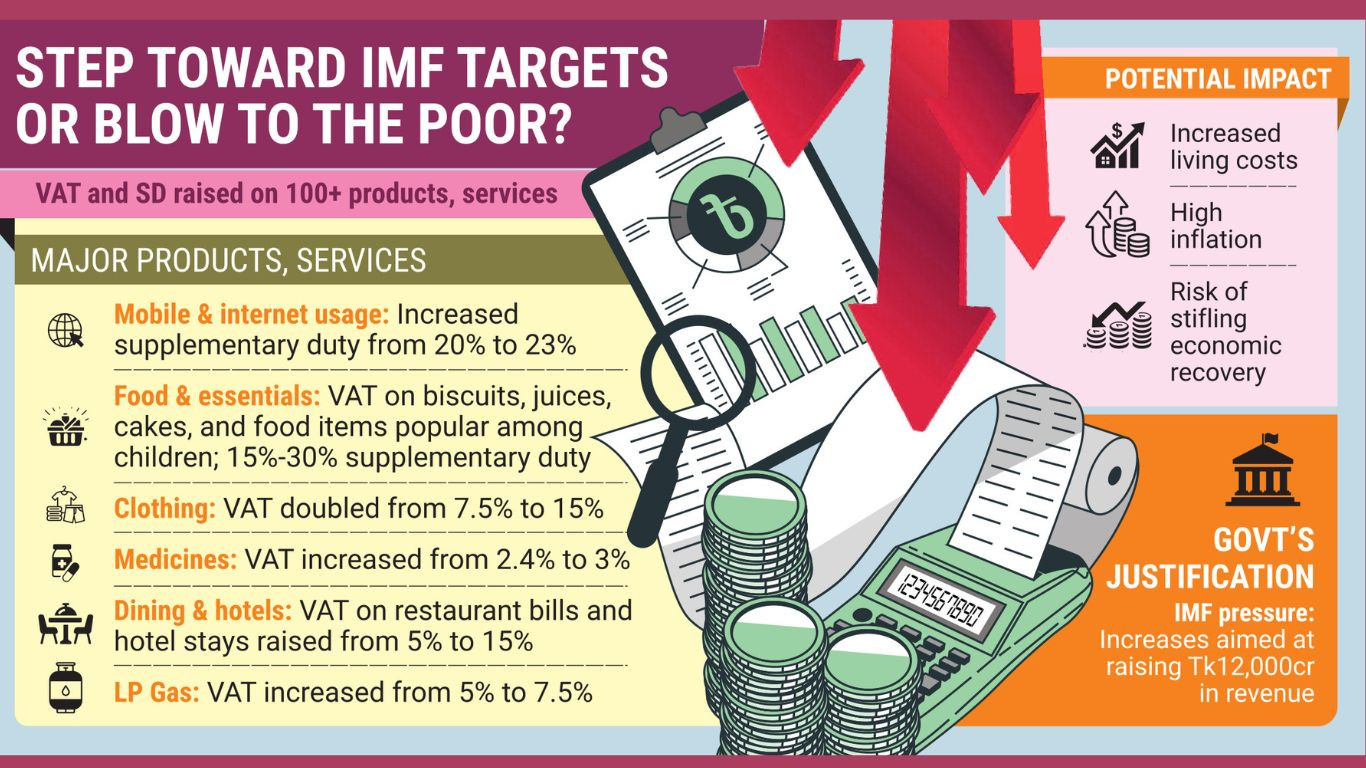Mohammad Zakaria
Published:2025-01-10 23:36:16 BdST
VAT, SD hikesStrain on household budgets ahead of Ramadan
Just two months ahead of the holy month of Ramadan, the interim government has announced a significant increase in Value Added Tax (VAT) and Supplementary Duty (SD) on over 100 products and services, a move that is expected to put further strain on household budgets, worsen inflation, and impede the country's fragile economic recovery.
The government’s decision has sparked concerns among economists, who warn that the hike in taxes will disproportionately affect low- and lower-middle-income groups.
With inflation already high, they believe the VAT and SD increases will be particularly challenging for those struggling to make ends meet.
The VAT and SD increases will impact a wide range of everyday goods and services, from mobile phone usage and internet access to food products and clothing.
The government says the move is necessary to meet the conditions set by the International Monetary Fund (IMF), which has recommended raising an additional Tk12,000 crore in revenue for the current fiscal year.
But economists argue that raising taxes in the middle of an already difficult fiscal year could not have come at a worse time. With inflation remaining in double digits, the price hikes will likely hit consumers hardest in the lead-up to Ramadan and Eid-ul-Fitr, when demand for food, clothing, and other essentials typically surges.
Inflation in Bangladesh showed some signs of easing in December, but the figures are still troubling. Food inflation fell slightly to 12.92%, while overall inflation dropped to 10.89%.
However, both remain in double digits, putting additional pressure on households, especially those with fixed incomes.
According to the Bangladesh Bureau of Statistics (BBS), the annual average inflation rate for 2024 stood at 10.33%, up from 9.55% the previous year. For many families, these high inflation rates mean they’re spending more just to cover basic living expenses.
Dr Zahid Hussain, a former lead economist at the World Bank’s Dhaka office, said that the immediate impact of the VAT, SD, and excise duty hikes will be felt most by low- and lower-middle-income groups.
“Many of the products included in the VAT increase are staples for low-income households. With inflation already so high, the burden will only get heavier, particularly in the lead-up to Ramadan and Eid,” he explained.
Dr Mostafizur Rahman, a fellow at the Centre for Policy Dialogue (CPD), echoed these concerns.
“The timing of the VAT and SD increases isn’t ideal, but the government is under pressure from the IMF to raise revenue. The decision will certainly add to the strain on households during this high-inflation period,” he said.
He suggested that while the measures may feel burdensome now, they could help stabilise the economy in the longer term.
Govt’s move to raise taxes
The government issued two ordinances on Thursday night that will see VAT and SD increased across a range of products and services.
The changes, which took effect immediately, will raise costs for a variety of everyday goods, including mobile phones, clothing, restaurant bills, and LP gas.
Among the key changes, VAT on medicines at the trading stage will rise from 2.4% to 3%, VAT on restaurant bills and hotel stays will increase from 5% to 15%, and VAT on clothing items will double from 7.5% to 15%.
Other measures include an increase in excise duties on air tickets, with domestic flights seeing an additional Tk200, and international flights facing hikes ranging from Tk1,000-Tk4,000, depending on the destination. Hajj passengers will remain exempt from the duty increases.
Products like biscuits, juices, and cakes – popular among children – will now be subject to 15%-30% supplementary duty and 15% VAT. VAT on tissue products has also doubled, from 7.5% to 15%.
In total, around 50 products will see an increase in supplementary duties, including imported fruits, mobile services, and other household items. The supplementary duty on mobile phone usage, for example, will rise from 20% to 23%.
The ordinances were approved by the government’s advisory council and issued after consultation with the law ministry.
According to government officials, these steps were taken to meet the IMF’s revenue targets and secure the necessary budgetary support to address the country’s ongoing economic challenges.
While the government has defended the decision as essential to economic recovery, many worry that the short-term pain may outweigh the benefits, particularly for the most vulnerable sectors of society.
Unauthorized use or reproduction of The Finance Today content for commercial purposes is strictly prohibited.


